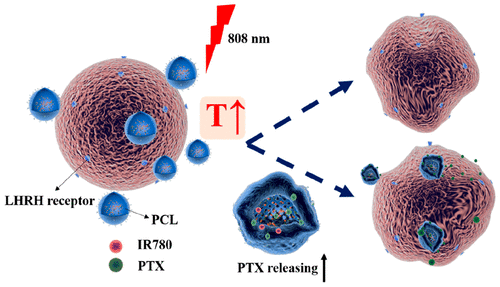当前位置:
X-MOL 学术
›
ACS Biomater. Sci. Eng.
›
论文详情
Our official English website, www.x-mol.net, welcomes your
feedback! (Note: you will need to create a separate account there.)
Tumor-Targeting Polycaprolactone Nanoparticles with Codelivery of Paclitaxel and IR780 for Combinational Therapy of Drug-Resistant Ovarian Cancer
ACS Biomaterials Science & Engineering ( IF 5.4 ) Pub Date : 2020-03-23 , DOI: 10.1021/acsbiomaterials.0c00163 Qianqian Pan 1, 2 , Jingjun Tian 1 , Huihui Zhu 1 , Liangjie Hong 3 , Zhengwei Mao 3 , Joaquim Miguel Oliveira 4, 5, 6 , Rui L. Reis 4, 5, 6 , Xiao Li 1
ACS Biomaterials Science & Engineering ( IF 5.4 ) Pub Date : 2020-03-23 , DOI: 10.1021/acsbiomaterials.0c00163 Qianqian Pan 1, 2 , Jingjun Tian 1 , Huihui Zhu 1 , Liangjie Hong 3 , Zhengwei Mao 3 , Joaquim Miguel Oliveira 4, 5, 6 , Rui L. Reis 4, 5, 6 , Xiao Li 1
Affiliation

|
Synergetic treatments that combine chemotherapy with photothermal/photodynamic therapy have been developed as promising new strategies for cancer therapy, especially for drug-resistant cancers. To achieve optimized synergetic outcomes for cancer therapy, it is highly desirable to selectively and simultaneously deliver both chemotherapeutics and near-infrared photosensitizers to the cancer tissues and cells, enhancing local accumulation. Here we report the preparation of poly-ε-caprolactone nanoparticles (PCL NPs) using bovine albumin as a stabilizer; the nanoparticles are loaded with IR780 and paclitaxel (PTX) for combinational phototherapy and chemotherapy. Moreover, in order to enable active targeting toward ovarian cancer, a specific peptide recognizing luteinizing hormone-releasing hormone receptors (LHRH) on ovarian cancer cells was covalently grafted onto the surface of the as-prepared NPs. As a result, LHRH peptide modified PCL (PCL-LHRH) NPs demonstrated increased internalization in ovarian tumor cells in vitro and selective targeting in tumor xenografts in vivo. PTX and IR780 can be efficiently encapsulated into PCL-LHRH NPs by an oil-in-water emulsion and solvent evaporation method. The systematic administration of ovarian tumor targeting PCL-LHRH/IR780-PTX can efficiently hinder the growth of drug-resistant xenografts in vivo with the assistance of an 808 nm near-infrared laser. These findings indicate that peptide mediated tumor targeting multifunctional nanomaterials may have remarkable profits in controlled drug delivery and synergistic therapy on drug-resistant cancer.
中文翻译:

紫杉醇和IR780联合靶向肿瘤的聚己内酯纳米颗粒用于耐药性卵巢癌的联合治疗
已开发出将化学疗法与光热/光动力疗法相结合的协同疗法,作为有前景的癌症治疗新策略,特别是对于耐药性癌症。为了实现用于癌症治疗的最佳协同效果,非常需要选择性地同时向癌症组织和细胞递送化学治疗剂和近红外光敏剂,以增强局部蓄积。在这里,我们报道了使用牛白蛋白作为稳定剂制备聚-ε-己内酯纳米粒子(PCL NPs)的方法。纳米粒子装有IR780和紫杉醇(PTX),用于光疗和化学疗法的组合。此外,为了能够主动针对卵巢癌,将识别卵巢癌细胞上的促黄体生成素释放激素受体(LHRH)的特定肽共价移植到所制备NP的表面上。结果,LHRH肽修饰的PCL(PCL-LHRH)NPs在体外显示出在卵巢肿瘤细胞中的内在化增强,并且在体内肿瘤异种移植中具有选择性靶向性。通过水包油乳液和溶剂蒸发方法,可以将PTX和IR780有效地封装到PCL-LHRH NP中。靶向PCL-LHRH / IR780-PTX的卵巢肿瘤的系统给药可以借助808 nm近红外激光有效地阻碍体内耐药性异种移植物的生长。
更新日期:2020-04-23
中文翻译:

紫杉醇和IR780联合靶向肿瘤的聚己内酯纳米颗粒用于耐药性卵巢癌的联合治疗
已开发出将化学疗法与光热/光动力疗法相结合的协同疗法,作为有前景的癌症治疗新策略,特别是对于耐药性癌症。为了实现用于癌症治疗的最佳协同效果,非常需要选择性地同时向癌症组织和细胞递送化学治疗剂和近红外光敏剂,以增强局部蓄积。在这里,我们报道了使用牛白蛋白作为稳定剂制备聚-ε-己内酯纳米粒子(PCL NPs)的方法。纳米粒子装有IR780和紫杉醇(PTX),用于光疗和化学疗法的组合。此外,为了能够主动针对卵巢癌,将识别卵巢癌细胞上的促黄体生成素释放激素受体(LHRH)的特定肽共价移植到所制备NP的表面上。结果,LHRH肽修饰的PCL(PCL-LHRH)NPs在体外显示出在卵巢肿瘤细胞中的内在化增强,并且在体内肿瘤异种移植中具有选择性靶向性。通过水包油乳液和溶剂蒸发方法,可以将PTX和IR780有效地封装到PCL-LHRH NP中。靶向PCL-LHRH / IR780-PTX的卵巢肿瘤的系统给药可以借助808 nm近红外激光有效地阻碍体内耐药性异种移植物的生长。











































 京公网安备 11010802027423号
京公网安备 11010802027423号